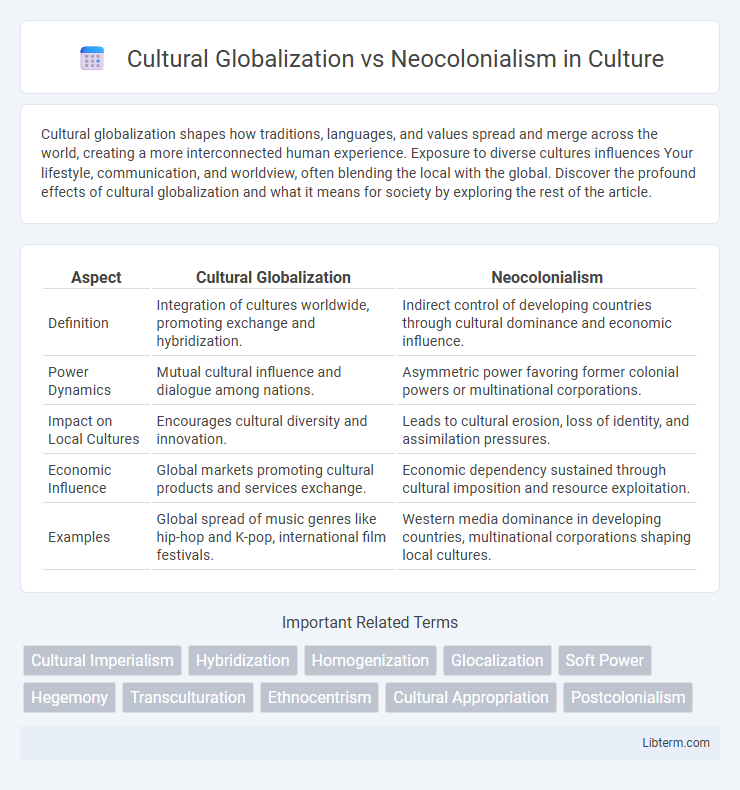Cultural globalization shapes how traditions, languages, and values spread and merge across the world, creating a more interconnected human experience. Exposure to diverse cultures influences Your lifestyle, communication, and worldview, often blending the local with the global. Discover the profound effects of cultural globalization and what it means for society by exploring the rest of the article.
Table of Comparison
| Aspect | Cultural Globalization | Neocolonialism |
|---|---|---|
| Definition | Integration of cultures worldwide, promoting exchange and hybridization. | Indirect control of developing countries through cultural dominance and economic influence. |
| Power Dynamics | Mutual cultural influence and dialogue among nations. | Asymmetric power favoring former colonial powers or multinational corporations. |
| Impact on Local Cultures | Encourages cultural diversity and innovation. | Leads to cultural erosion, loss of identity, and assimilation pressures. |
| Economic Influence | Global markets promoting cultural products and services exchange. | Economic dependency sustained through cultural imposition and resource exploitation. |
| Examples | Global spread of music genres like hip-hop and K-pop, international film festivals. | Western media dominance in developing countries, multinational corporations shaping local cultures. |
Introduction to Cultural Globalization and Neocolonialism
Cultural globalization refers to the worldwide exchange and integration of cultural elements, including ideas, values, customs, and media, fostering greater interconnectedness among diverse populations. Neocolonialism describes the economic, political, and cultural domination of developing countries by powerful nations despite formal political independence, often manifesting through control over resources and cultural influence. Understanding the dynamics between cultural globalization and neocolonialism reveals how global cultural flows can simultaneously promote cross-cultural dialogue and reinforce asymmetrical power relationships.
Historical Roots: From Colonialism to Neocolonialism
Colonialism established economic and political dominance by European powers over diverse regions, creating a foundation for cultural globalization marked by the spread of Western values and institutions. Neocolonialism perpetuates these structural inequalities through multinational corporations and international financial institutions, maintaining control over formerly colonized nations under the guise of globalization. The historical transition from direct colonial rule to indirect economic and cultural influence reveals persistent power imbalances shaping global interactions today.
Defining Cultural Globalization: Features and Drivers
Cultural globalization refers to the worldwide exchange and integration of cultural elements such as language, customs, values, and media, driven by advancements in communication technology, international trade, and migration. Key features include hybridization of cultures, increased cross-cultural interactions, and the spread of global consumer culture, often facilitated by multinational corporations and digital platforms. Major drivers encompass global media networks, transnational corporations, and international travel, which collectively accelerate cultural diffusion and influence local identities.
Neocolonialism: Mechanisms in the Modern World
Neocolonialism manifests through economic dependency, multinational corporations exploiting local resources, and cultural domination via media and consumer goods, perpetuating unequal power dynamics between developed and developing nations. Trade agreements and foreign aid often serve as tools to impose political agendas or maintain control over former colonies under the guise of globalization. This subtle form of control undermines sovereignty and reinforces systemic inequalities despite formal political independence.
Cultural Homogenization vs Cultural Diversity
Cultural globalization often leads to cultural homogenization, where dominant global cultures, particularly Western media and consumer products, marginalize local traditions and customs. This process raises concerns about neocolonialism, as it can perpetuate unequal power dynamics by imposing external cultural values on less dominant societies. Maintaining cultural diversity requires active efforts to protect and promote indigenous languages, arts, and practices amidst the expanding influence of globalized culture.
Media, Technology, and the Spread of Culture
The spread of global media and digital technology accelerates cultural globalization by enabling the rapid exchange of ideas, values, and entertainment across borders. However, this phenomenon often mirrors neocolonialism as dominant Western media conglomerates and tech giants control narratives and cultural representation, shaping global consumption patterns. The concentration of media power in the hands of a few corporations risks eroding local cultures and imposing homogenized cultural norms worldwide.
Economic Power and Cultural Influence
Economic power drives cultural globalization by enabling dominant countries and multinational corporations to export media, fashion, and technology worldwide, shaping global cultural consumption patterns. Neocolonialism manifests through the economic dominance of wealthy nations, which use cultural influence as a strategic tool to maintain control over less-developed regions by promoting values aligned with their own interests. This interplay between economic control and cultural dissemination reinforces global inequalities while blurring the lines between voluntary cultural exchange and imposed cultural hegemony.
Resistance and Local Agency
Cultural globalization often faces resistance when local communities actively assert their unique identities and challenge the homogenizing effects of global media and consumer culture. Local agency is manifested through the preservation and revival of indigenous languages, arts, and traditions, creating spaces that resist neocolonial cultural dominance. Grassroots movements, alternative media, and community-driven initiatives serve as powerful tools for countering neocolonial narratives and promoting cultural self-determination.
Case Studies: Effects across Regions
Cultural globalization has promoted cross-cultural exchanges and hybrid identities in regions like Southeast Asia and Latin America, fostering economic growth and innovation. However, neocolonialism manifests through media dominance and consumer culture imposition in Africa and the Middle East, often reinforcing economic dependencies and cultural homogenization. Case studies in India and Nigeria reveal how local traditions adapt or resist foreign influences, highlighting complex power dynamics in cultural globalization versus neocolonial control.
Future Perspectives: Navigating Globalization and Identity
Future perspectives on cultural globalization involve balancing the integration of diverse cultural identities while resisting neocolonial tendencies that impose dominant cultural norms. Emphasizing local agency and hybrid identities fosters resilience against cultural homogenization, allowing communities to adapt global influences without eroding their unique heritage. Technological advancements and transnational networks empower marginalized groups to assert their narratives, shaping globalization into a more equitable and culturally pluralistic process.
Cultural Globalization Infographic

 libterm.com
libterm.com